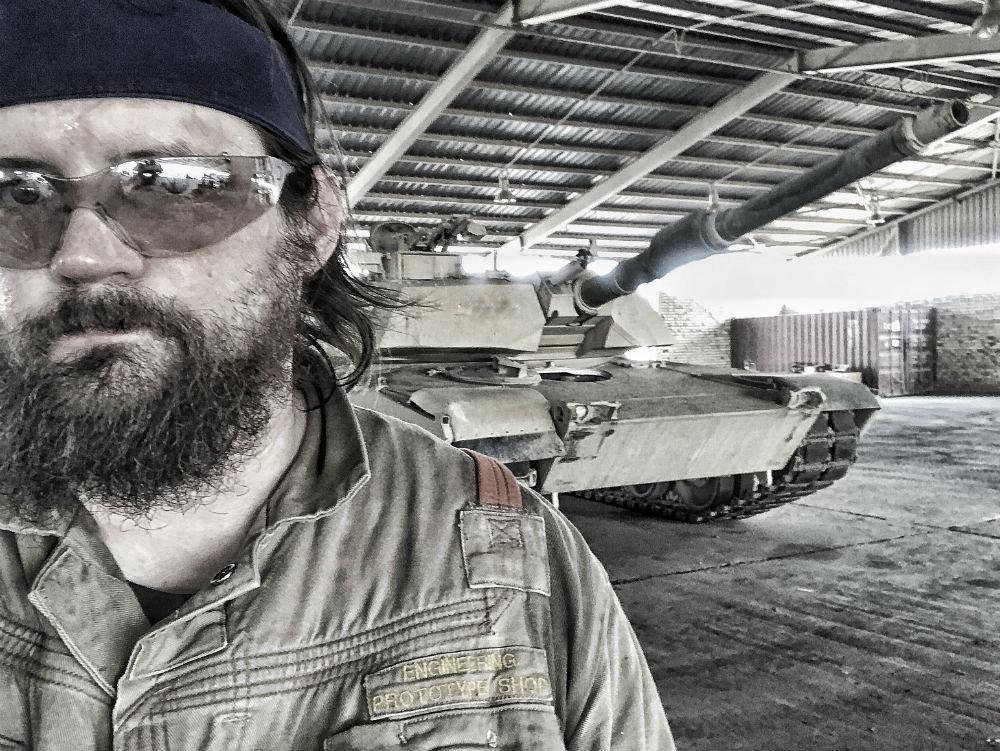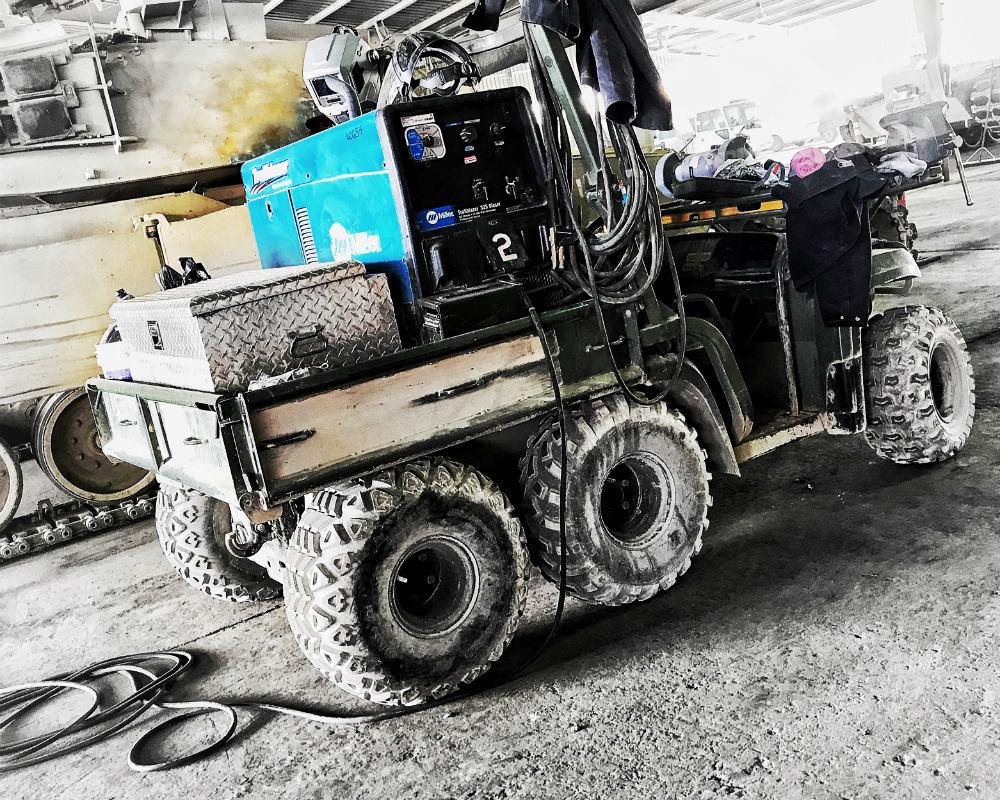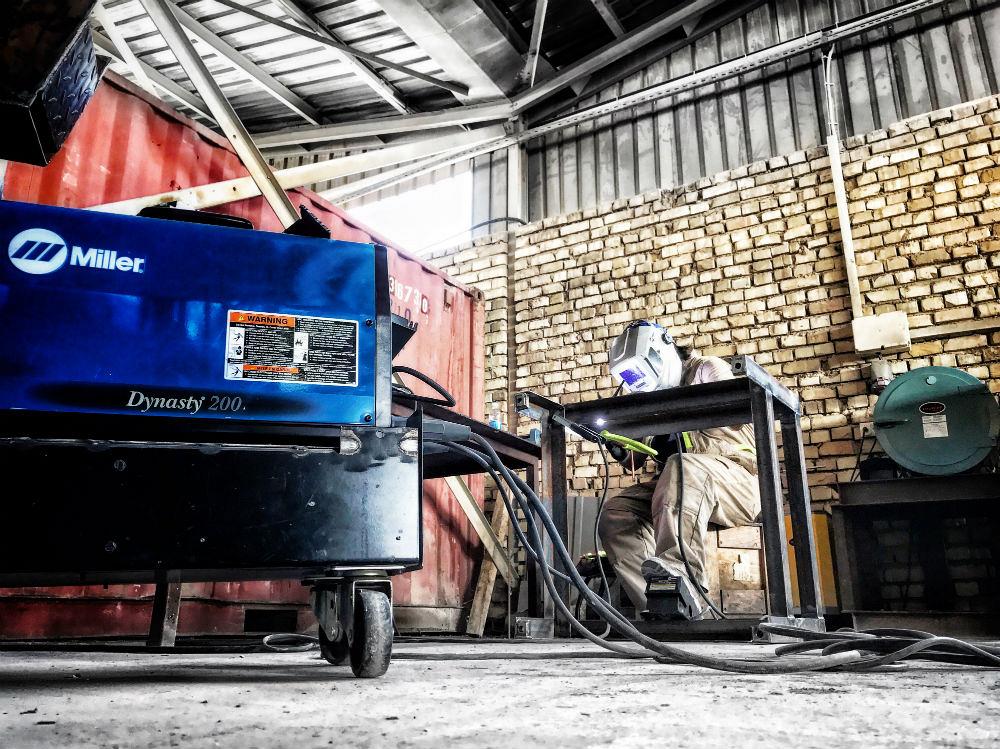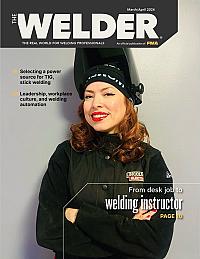Owner, Brown Dog Welding
- FMA
- The Fabricator
- FABTECH
- Canadian Metalworking
Categories
- Additive Manufacturing
- Aluminum Welding
- Arc Welding
- Assembly and Joining
- Automation and Robotics
- Bending and Forming
- Consumables
- Cutting and Weld Prep
- Electric Vehicles
- En Español
- Finishing
- Hydroforming
- Laser Cutting
- Laser Welding
- Machining
- Manufacturing Software
- Materials Handling
- Metals/Materials
- Oxyfuel Cutting
- Plasma Cutting
- Power Tools
- Punching and Other Holemaking
- Roll Forming
- Safety
- Sawing
- Shearing
- Shop Management
- Testing and Measuring
- Tube and Pipe Fabrication
- Tube and Pipe Production
- Waterjet Cutting
Industry Directory
Webcasts
Podcasts
FAB 40
Advertise
Subscribe
Account Login
Search
Welding in Iraq—A learning experience
- By Josh Welton
- December 15, 2017
A year ago around this time, I hit a low point. The morning of Black Friday we received a message that my shop had been broken into and robbed. I was on crutches because of a knee injury. Two of our cars had just been stolen. Four arm surgeries seemed to have made things worse. I unplugged for the winter. No writing, no art, just putting in hours at the day job.
With life’s stresses pulling and pushing me around, I kind of wanted to hit a refresh button this year. A chance to take an out-of-country work trip popped up, and I jumped on it. Darla was very understanding and knew I needed the challenge. So, my summer was spent in Iraq, just outside of Baghdad.
The specifics of the trip aren’t really open for discussion, but even in general terms, it was a pretty wild ride. I work for General Dynamics Land Systems in its prototype shop. Another section of GDLS was stationed in Camp Taji to repair and keep M1A1 Abrams tanks battle- ready. Once my work visa was set, I went from the relative comfort of the GDLS prototype shop to the extreme heat that is June, July, and August in the Middle East.
The drive from Baghdad’s airport to the base was eye-opening. So much of the city is decimated, and the infrastructure is in shambles. In my head, I thought, “I’ll never compare Detroit to Iraq again.”
The guys I worked with there are very good at what they do. I learned a lot about not just battle damage repairs, but about repair work in general just by being around them.
The trip also served as a way to get back into stick welding. I used to do a bit of arc welding as a millwright, but it had been years since I did much of it. I love the process, but in my day-to-day work at the prototype shop and in my shop, it’s just not something I often need. Out there we had John Deere Gators hauling either Trailblazers or Big Blues to whichever tank needed work. They were slick rigs. The electrodes were kept sealed until we needed them, then we kept them in an oven. Occasionally the flux would be so dry it would flake off, especially with a used rod on a restart.
I feel that with most new work situations, from working in restaurants to construction sites to factories to the trades to the art to the writing, I’ve followed a similar sequence since I was a kid:
- Excitement. This is going to be fun!
- Anxiety. What the hell did I get myself into?
- Frustration: Am I going to figure this out?
- Relief: OK, I’m figuring it out.
- Confidence: I’ve got this. How far can I take it?
This trip went the same way. I started listening to Joe Rogan’s podcast recently. He often talks about how we need to struggle; we need to work at something outside of our comfort zone to grow. Welding is such a dynamic trade, and it can be extremely humbling. But when you get it right, damn, it’s good to be a welder.
Iraq was outside my comfort zone—125 degrees F is really hot. Pro Tip: Don’t eat anything at lunch that might not sit well, because at those temps the Porta Johns are like stinky, melty saunas. Not fun. You would have thought I’d learn the first time.
It also blew my mind that a 70-ton vehicle, painted, was hot to the touch, even after sitting in the shade for a month. I’d sweat through my clothes, coveralls, and welding jacket within the first 45 minutes of the day. At that point, you don’t want to stop working. The sweat helps keep you cool, and when you dry out,” it’s miserable. But if you keep going and drink a lot of water, it’s not so bad.
Maybe this is common knowledge, and I just don’t live by reptiles and spiders and dragons that can murder me. Anyway, if something bites you, kill it. No, not for revenge. You’ll need it to show the doc, so he can give you the right antitoxins.
It hit at least 120 degrees Fahrenheit every day for three straight weeks. The 90-degree nights felt downright cool. I’d keep my room cold like Alaska. One thing I found interesting is that without alcohol on base, the only time we really socialized was to, from, and at dinner. My friend Alex, one of welders I worked with, said that at a previous maintenance site they lived and worked off base. There was a bar there, and most of the guys and girls deployed in the area would hang out late into the night. I enjoyed the nightly supper trip with the guys, but I didn’t mind the slow nights. Life is so crazy back here in Detroit that it was definitely nice to turn my brain off, watch a movie, and chill.
The first 2 months flew by, as I didn’t do much outside of work and sleep. The last month was a bit of a grind. The workflow was sporadic, and toiling in a hair dryer became a bit more daunting. Most of the guys out there were on long term assignments; I feel lucky that I was able to get a taste of the action without leaving my day job.
The question I get asked more than any other is: “How do I get a job welding overseas?” My situation was an odd duck, a path that won’t work for most. What you can do is look up defense contractors and watch their job boards. They might have postings specifically for gigs in the Middle East. If not, you can try to find a job welding on a military base in the states. In this case, the goal would be to get experience with Strykers, Abrams, or other military vehicles, and when there is an opening you can jump at the opportunity. Keep an eye on sites like dangerzonejobs.com as well.
The trip was an adventure I feel lucky to have experienced. There’s definitely a dose of perspective that came with it. I’d do it again without hesitation, but I feel lucky to live and work in Detroit.
All images courtesy of Josh Welton, Brown Dog Welding.
subscribe now
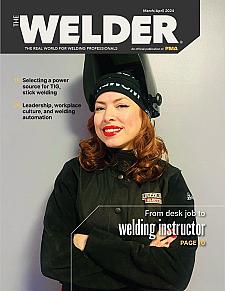
The Welder, formerly known as Practical Welding Today, is a showcase of the real people who make the products we use and work with every day. This magazine has served the welding community in North America well for more than 20 years.
start your free subscriptionAbout the Author

About the Publication
- Stay connected from anywhere

Easily access valuable industry resources now with full access to the digital edition of The Fabricator.

Easily access valuable industry resources now with full access to the digital edition of The Welder.

Easily access valuable industry resources now with full access to the digital edition of The Tube and Pipe Journal.
- Podcasting
- Podcast:
- The Fabricator Podcast
- Published:
- 04/16/2024
- Running Time:
- 63:29
In this episode of The Fabricator Podcast, Caleb Chamberlain, co-founder and CEO of OSH Cut, discusses his company’s...
- Trending Articles
Sheffield Forgemasters makes global leap in welding technology
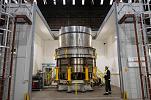
ESAB unveils Texas facility renovation
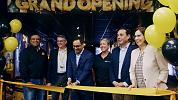
Engine-driven welding machines include integrated air compressors

The impact of sine and square waves in aluminum AC welding, Part I
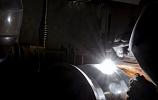
How welders can stay safe during grinding
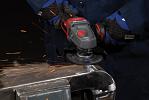
- Industry Events
16th Annual Safety Conference
- April 30 - May 1, 2024
- Elgin,
Pipe and Tube Conference
- May 21 - 22, 2024
- Omaha, NE
World-Class Roll Forming Workshop
- June 5 - 6, 2024
- Louisville, KY
Advanced Laser Application Workshop
- June 25 - 27, 2024
- Novi, MI
























